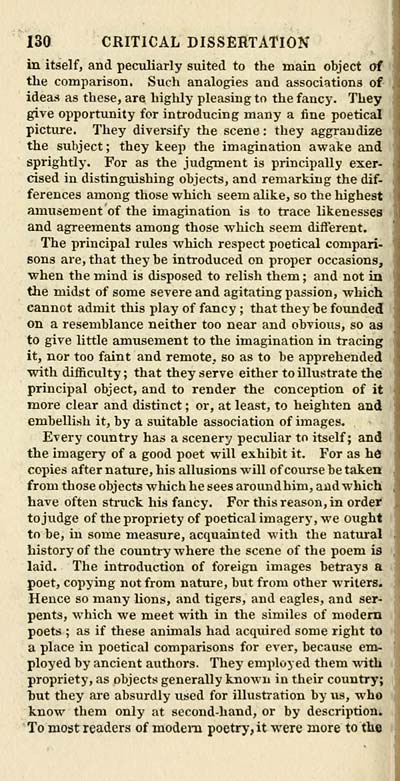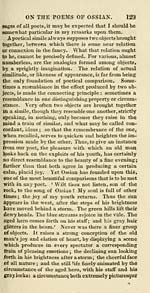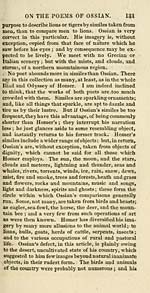Ossian Collection > Poems of Ossian
(138)
Download files
Complete book:
Individual page:
Thumbnail gallery: Grid view | List view

130 CRITICAL DISSERTATION
in itself, and peculiarly suited to the main object of
the comparison. Such analogies and associations of
ideas as these, are highly pleasing tn the fancy. They
give opportunity for introducing many a fine poetical
picture. They diversify the scene : they aggrandize
the subject; they keep the imagination awake and
sprightly. For as the judgment is principally exer-
cised in distinguishing objects, and remarking the dif-
ferences among those which seem alike, so the highest
amusement of the imagination is to trace likenesses
and agreements among those which seem different.
The principal rules which respect poetical compari-
sons are, that they be introduced on proper occasions,
when the mind is disposed to relish them ; and not ia
the midst of some severe and agitating passion, which
cannot admit this play of fancy ; that they be founded
on a resemblance neither too near and obvious, so as
to give little amusement to the imagination in tracing
it, nor too faint and remote., so as to be apprehended
with difficulty ; that they serve either to illustrate the
principal object, and to render the conception of it
more clear and distinct ; or, at least, to heighten and
embellish it, by a suitable association of images.
Every country has a scenery peculiar to itself; and
the imagery of a good poet will exhibit it. For as he
copies after nature, his allusions will of course be taken
from those objects which he sees aroundhim, and which
have often sti-uck his fancy. For this reason, in order
to judge of the propriety of poetical imagery, we ought
to be, in some measure, acquainted w ith the natural
history of the country where the scene of the poem is
laid. The introduction of foreign images betrays a
poet, copying not from nature, but from other writers.
Hence so many hons, and tigers, and eagles, and ser-
pents, which we meet with in the similes of modem
poets ; as if these animals had acquired some right to
a place in poetical comparisons for ever, because em-
ployed by ancient authors. They employed them with
propriety, as objects generally known in their country;
but they are absurdly used for illustration by us, who
know them only at second-hand, or by description.
To most readers of modem poetry, it were more to the
in itself, and peculiarly suited to the main object of
the comparison. Such analogies and associations of
ideas as these, are highly pleasing tn the fancy. They
give opportunity for introducing many a fine poetical
picture. They diversify the scene : they aggrandize
the subject; they keep the imagination awake and
sprightly. For as the judgment is principally exer-
cised in distinguishing objects, and remarking the dif-
ferences among those which seem alike, so the highest
amusement of the imagination is to trace likenesses
and agreements among those which seem different.
The principal rules which respect poetical compari-
sons are, that they be introduced on proper occasions,
when the mind is disposed to relish them ; and not ia
the midst of some severe and agitating passion, which
cannot admit this play of fancy ; that they be founded
on a resemblance neither too near and obvious, so as
to give little amusement to the imagination in tracing
it, nor too faint and remote., so as to be apprehended
with difficulty ; that they serve either to illustrate the
principal object, and to render the conception of it
more clear and distinct ; or, at least, to heighten and
embellish it, by a suitable association of images.
Every country has a scenery peculiar to itself; and
the imagery of a good poet will exhibit it. For as he
copies after nature, his allusions will of course be taken
from those objects which he sees aroundhim, and which
have often sti-uck his fancy. For this reason, in order
to judge of the propriety of poetical imagery, we ought
to be, in some measure, acquainted w ith the natural
history of the country where the scene of the poem is
laid. The introduction of foreign images betrays a
poet, copying not from nature, but from other writers.
Hence so many hons, and tigers, and eagles, and ser-
pents, which we meet with in the similes of modem
poets ; as if these animals had acquired some right to
a place in poetical comparisons for ever, because em-
ployed by ancient authors. They employed them with
propriety, as objects generally known in their country;
but they are absurdly used for illustration by us, who
know them only at second-hand, or by description.
To most readers of modem poetry, it were more to the
Set display mode to: Large image | Transcription
Images and transcriptions on this page, including medium image downloads, may be used under the Creative Commons Attribution 4.0 International Licence unless otherwise stated. ![]()
| Early Gaelic Book Collections > Ossian Collection > Poems of Ossian > (138) |
|---|
| Permanent URL | https://digital.nls.uk/81239525 |
|---|
| Description | Selected books from the Ossian Collection of 327 volumes, originally assembled by J. Norman Methven of Perth. Different editions and translations of James MacPherson's epic poem 'Ossian', some with a map of the 'Kingdom of Connor'. Also secondary material relating to Ossianic poetry and the Ossian controversy. |
|---|
| Description | Selected items from five 'Special and Named Printed Collections'. Includes books in Gaelic and other Celtic languages, works about the Gaels, their languages, literature, culture and history. |
|---|

